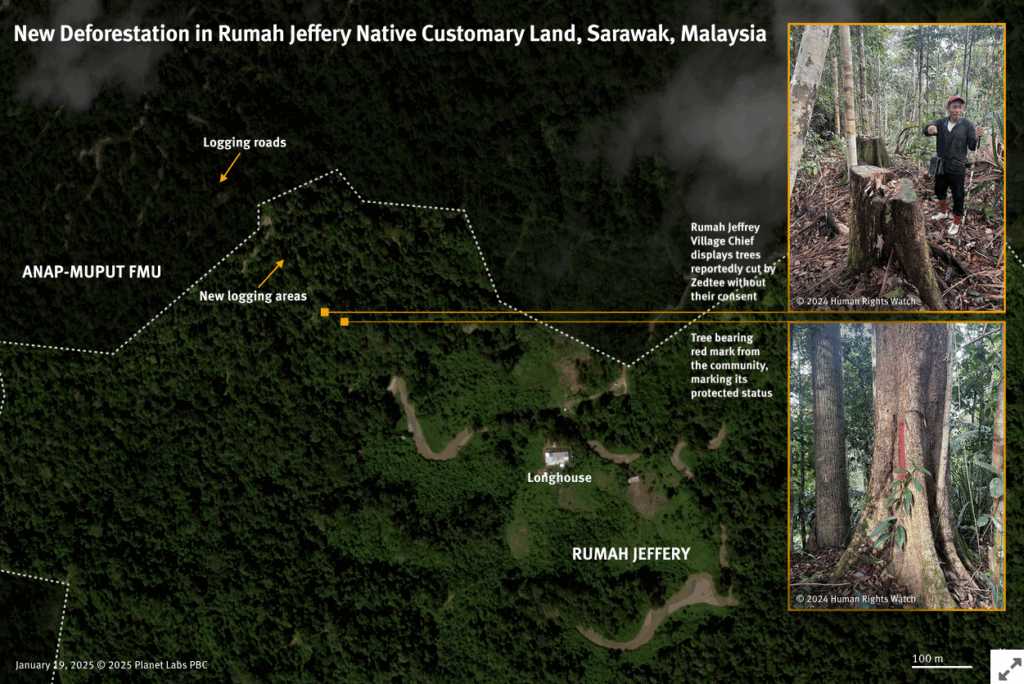Malaysia’s Sarawak state has come under international criticism following the release of a Human Rights Watch (HRW) report detailing failures to protect an Indigenous Iban community from unauthorised logging and land encroachment.
The 60-page report, released on 5 May 2025, outlines how the company Zedtee, part of the Shin Yang Group, logged ancestral lands belonging to the Iban community of Rumah Jeffery without their consent. The report underscores that Zedtee’s actions violated local laws and sustainability certification rules.
Despite the violations, the Sarawak government did not take action against the company. Instead, authorities threatened to arrest Indigenous protesters and demolish their homes.
According to HRW, such conduct violates both Malaysian law and international standards, including the UN Declaration on the Rights of Indigenous Peoples. The report calls on Malaysia’s federal government to enact enforceable legal protections for Indigenous rights.
Luciana Téllez Chávez, HRW’s senior environment researcher, stated, “The Sarawak government should protect Rumah Jeffery’s rights and ensure that Zedtee compensates the community for the harm suffered.”
Rumah Jeffery is a community of approximately 60 people living along the Belawit River. Residents rely on the rainforest for food, income, and cultural practices. The community cultivates vegetables and harvests natural resources, selling surplus produce in local markets.
With support from the Sarawak Dayak Iban Association (SADIA), the community has documented their longstanding presence on the land. Aerial photographs from 1951 support their claim under the Sarawak Land Code, which recognises native customary rights.
SADIA’s general secretary, Nicholas Mujah, said that Rumah Jeffery meets all legal requirements for recognition of their customary land rights.
Nonetheless, Zedtee was granted two overlapping leases covering the entirety of Rumah Jeffery’s territory – one for logging and one for a tree plantation. The logging concession is certified under the Malaysian Timber Certification Scheme, which mandates respect for Indigenous rights.
Despite this, the company proceeded with logging in 2022 without obtaining free, prior, and informed consent from the community – a violation of both international standards and the certification scheme’s terms.

When villagers protested the logging, they were met with threats from Sarawak Forest Department officials. Later, police issued an eviction notice targeting not only Rumah Jeffery but also five other Indigenous communities affected by Zedtee’s operations.
This eviction order, issued in October 2022, has not yet been enforced. However, its continued existence contributes to significant stress and insecurity for the affected communities.
If implemented, the eviction would contravene international human rights standards and amount to a forced eviction, HRW noted.
The tree plantation operated by Zedtee is not certified, in contravention of Sarawak’s stated policy requiring sustainability certification for all such operations. Nonetheless, the Forest Department defended the plantation, claiming it was operated in line with all applicable regulations.
The Certification Council acknowledged the allegations and stated it is reviewing its standards. Meanwhile, SIRIM, responsible for auditing Zedtee’s logging concession, and the Sarawak Land and Survey Department have not responded to HRW’s requests for comment.
The Shin Yang Group, Zedtee’s parent company, lists Japan, the EU, and the US as primary markets for its timber exports. In 2023, Sarawak’s timber exports reached MYR 2.3 billion (approximately US$560 million), with tree plantations being the leading cause of deforestation in the region.
Human Rights Watch urged these top importing nations to enforce existing laws, such as the EU Timber Regulation, the US Lacey Act Amendment of 2008, and Japan’s Clean Wood Act. These laws are designed to prevent the importation of wood products linked to illegal logging and human rights violations.
HRW also called on Malaysia’s federal government to implement a cap on tree plantations, similar to existing policies on oil palm, and to make sustainability certification mandatory.
“The international trade of wood products tainted by human rights abuses and deforestation is a shared responsibility between sellers and buyers,” said Téllez Chávez. “They both need to clean up supply chains, protect rights, and safeguard nature.”
The post Malaysia’s Sarawak government under scrutiny for failure to protect Iban Indigenous land rights appeared first on The Online Citizen.


